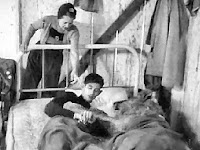A recent article in The Washington Post, titled
Mild Kingdom: Wild Animals, a Life of Captivity, and the Future of Zoos, has a lot of good ideas in it, enough to fuel a lot of commentary, but one thing jumped out at me:
"By managing nearly every part of an animal's life, the zoo is able to re-create enough of the culture of the wilderness for a wild animal to live comfortably."
Using the word "culture" in reference to the way animals live their lives represents such a breakthrough in the general public's mindset, that I wonder if the author is even aware of the deep ramifications of using that word.
She goes on to describe the common failures of releasing captive-raised animals to the wild, speculating that the time spent in captivity somehow changes the animals.
But natural populations of animals do have their own cultures, with knowledge handed down from generation to generation. We learned long ago (see Born Free) that predators need to be taught how to hunt. What is changed in captive-raised animals is that they are raised without their native culture, and somewhat a part of human culture.
The cultures of animals in their native habitats are unknown and mysterious to us because animals live with different sensations than we do and this naturally results in different expressions of their culture. For one example, our remarkably insensitive noses blind us to much of the information that's out there, whereas some animals explore their world primarily by scent.
We may think a tiger lives a largely solitary existence. But with a world of scents availble to him, the tiger may feel connected to his relatives and have relationships we are unaware of. And it is only a very recent discovery that elephants communicate via sounds that we consider below the range of hearing. Communication is key to a culture, and we simply don't know all the various means that other animals use to communicate.
The article describes many ways that zookeepers are awakening to the intelligence and mental needs of the animals in their care. A lot of the process depends on a willingness to discard old human notions and begin to really, truly pay attention to the animals. If we could teach everyone that each animal in fact comes from its own culture, a rich and vital culture, with all the subtleties embedded in our understanding of the word culture, think how much better the world would be.
I'll keep on saying it: If the human world could adopt the idea that intelligent life is indeed all around us, and approach animals with that mindset (instead of the mindset that humans are the only intelligent life), ultimately life itself would be better for every species on the planet. Including humans.















